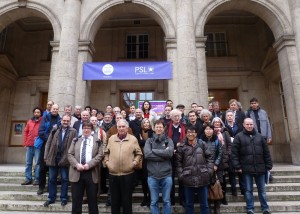
Group photo of the French Linear Collider Days on March 2016, Paris. Photo: Romain Andrieu (CEA/Irfu)
The international session started with opening notes from the management of CNRS-IN2P3 and CEA-Irfu. The international context was reviewed in three dedicated talks about Japan (by Saturo Yamashita, Tokyo University), US (by Mike Harrison, BNL) and Europe. The attendance’s attention was particularly triggered by recent encounters of Japanese and US representatives. For Europe, François Le Diberder (Paris Diderot University/LAL) stated that Europe is a strong partner in the Linear Collider Collaboration with a wide range of activities are supported by European, national or even local funding grants.
The JCL2016 workshop gave a broad floor to presentations of recent accelerator R&D developments. Sessions started with an overview of the ILC design including ongoing design changes, as for instance the re-establishement of a vertical shaft or a common L* for the two ILC detectors (L* is the distance between the last quadrupole magnet and the interaction point). A highlight was the production of cryomodules for the European XFEL project, with significant French contributions from CEA-Irfu and LAL (CNRS-IN2P3, Paris-Sud University). Beyond the current status extrapolations for the case of the ILC construction were also made. French groups play a leading role in the experimental programme of the ATF2 test facility at KEK, keywords are beam halo monitoring and beam stabilisation. Furthermore, the status of the studies towards a (conventional) positron source was summarised. The latter in particular is considered intensively for the CLIC project. This and the review of the CLIC/CTF3 status underlines the broad scope of activities on Linear Collider R&D in the French laboratories. The accelerator sessions closed with an overview on the R&D into superconducting RF cavities in Japan.
Review of the latest LHC results is always a key part of the French Linear Collider Days. Naturally, most excitement has been caused by the newest preliminary results on the 750 GeV-bump presented by the ATLAS and CMS experiments. The workshop came timely right after the electroweak week of the Moriond Conference. Attendants agreed that whether or not the “bump” gets confirmed in 2016, the linear-collider physics case remains strong since it is presumably the only tool that can decipher with sufficient precision the origin of electroweak symmetry breaking. A linear collider facility that provides different operation modes including photon-photon collisions could also play a crucial role in case of a discovery.
The detector R&D for the linear collider was also reviewed. French groups are mainly engaged in the ILD detector concept and hold positions in the management and technical coordination. Within the various R&D collaborations, the French groups have been making significant contributions to calorimetry, gaseous tracking and vertex detectors with a scope that goes often beyond the needs of a linear collider for more than 10 years. Smart and state-of-the-art reconstruction algorithms complement the hardware activities.
Communication is a central task to gather support for major projects like the Linear Collider. At the JCL2016 the launch of the Collisionneur Linéraire France website was announced. It aims at providing relevant linear collider information for the French community. In 2015 representatives of the French Linear Collider community embarked on a considerable list of actions such as a meeting with Japanese Diet members and the Japanese consul in Strasbourg that were summarised in a dedicated talk. As member of the local organising team, composed of CEA/Irfu and IN2P3 members, and participant I surely believe this edition was a success! We are all looking forward to the next edition in 2017.

Recent Comments